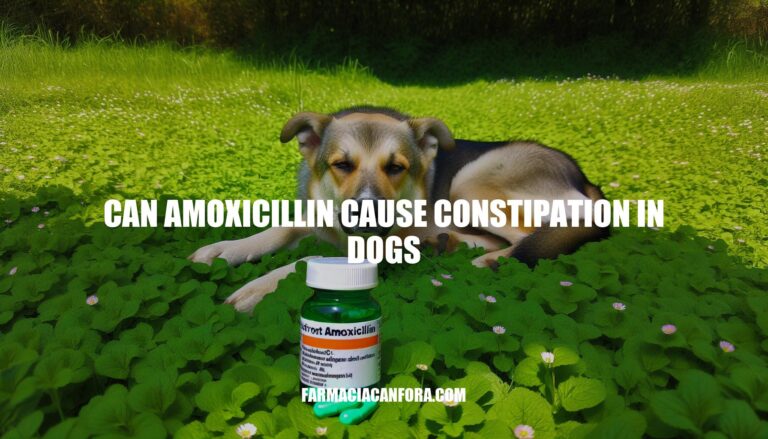


Amoxicillin is a widely used antibiotic in veterinary medicine, known for its effectiveness against a variety of bacterial infections. Commonly, it treats skin, respiratory, and urinary tract infections in animals. This article will explore whether amoxicillin can cause constipation in dogs.
Amoxicillin functions as an antibiotic in dogs by inhibiting the synthesis of bacterial cell walls. This action disrupts the structural integrity of bacterial cells, causing them to burst and die. It is typically prescribed for a variety of bacterial infections, including skin infections, respiratory infections, urinary tract infections, and gastrointestinal infections.
Here are the common side effects of amoxicillin in dogs, with a focus on gastrointestinal issues:
If you notice any of these symptoms, it’s best to consult your veterinarian.
Amoxicillin can disrupt the balance of beneficial gut bacteria in dogs by targeting not only harmful bacteria but also the good bacteria in the gut. This disruption can lead to a condition known as dysbiosis, where the natural microbial balance is disturbed.
Here’s how this process affects digestion and stool formation:
Reduction of Beneficial Bacteria: Amoxicillin reduces the population of beneficial bacteria that aid in digestion. These bacteria are crucial for breaking down food and absorbing nutrients.
Slowed Digestive Transit: With fewer beneficial bacteria, the digestive process slows down. This can lead to a slower movement of food through the intestines.
Water Absorption: As the movement of food slows, more water is absorbed from the stool in the intestines, making it harder and more difficult to pass.
Constipation: The combination of slower transit and increased water absorption results in constipation, where the dog struggles to pass stool.
Ensuring your dog stays hydrated and considering probiotics can help mitigate these effects and support gut health during antibiotic treatment.
Here are the symptoms of constipation in dogs and how to recognize them:
Other signs to watch for include a tense abdomen, decreased appetite, and general discomfort or lethargy. If you notice these symptoms, it’s a good idea to consult your vet for advice and treatment options.
Here are some tips and strategies for managing constipation in dogs taking amoxicillin:
Always consult your vet before making significant changes to your dog’s diet or medication regimen.
If your dog is experiencing constipation while on amoxicillin, seek veterinary care if:
Professional guidance is crucial to prevent complications like intestinal blockages. Always consult your vet for the best course of action.
Amoxicillin, a commonly used antibiotic in veterinary medicine, can cause constipation in dogs as a side effect. This occurs due to the disruption of beneficial gut bacteria, leading to slowed digestion and water absorption, resulting in hard stools and difficulty passing stool.
Symptoms of constipation in dogs include straining to defecate, hard stools, and infrequent bowel movements. To manage constipation while on amoxicillin, dietary adjustments such as increasing fiber and probiotics can be helpful, along with ensuring adequate hydration.
Veterinary interventions may also be necessary in severe cases. It is essential to consult a veterinarian for proper guidance and treatment options if your dog experiences constipation while taking amoxicillin.